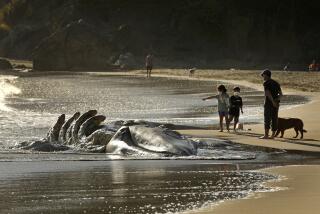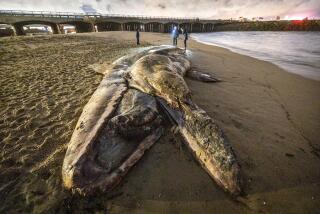Suit alleges U.S. ignored ‘best available science’ in sonar ruling
The National Marine Fisheries Service violated federal law when it authorized the Navy’s use of sonar in training exercises off Hawaii and California through 2018, an environmental group said in a lawsuit filed Monday.
The agency’s own analysis had determined the war games would result in 155 marine mammal deaths, more than 2,000 permanent injuries and about 9.6 million instances of temporary hearing loss and disruptions of vital behaviors — an 1,100% increase over the previous five-year period, according to the Natural Resources Defense Council.
Beaked whales, a little understood deep-diving species, and endangered blue whales would be particularly harmed by the amphibious and anti-submarine warfare exercises that are scheduled to include nearly 60,000 hours of sonar broadcasts and detonation of more than 250,000 explosives, the lawsuit said.
The fisheries service authorized up to 10 beaked whale and 13 blue whale deaths as a result of vessel strikes during the exercises.
“This is an unprecedented level of harm,” Zak Smith, an attorney with the Natural Resources Defense Council, said. “In order to authorize these impacts on marine mammals, the service had to turn its back on the best available science.”
The lawsuit accuses the service of violating the Marine Mammal Protection Act when it determined that the exercises would have a “negligible impact” on marine mammals. It also challenged the Navy’s determination that the exercises were consistent with California’s Coastal Management Program, despite a unanimous rejection of that conclusion by the California Coastal Commission.
In response to criticism, the Navy and fisheries service said they have established “practical and reasonably effective” safety measures to protect marine mammals — including posting lookouts on the bridges of ships and reducing the power of sonar or shutting it down when whales are spotted nearby.
The Navy began operating under the rules of the fisheries service’s new authorization Dec. 26.
The Natural Resources Defense Council filed the lawsuit in U.S. District Court in San Francisco on behalf of five environmental organizations. A similar suit was filed last week in Hawaii by Earthjustice on a behalf of five other groups.
The lawsuits are the latest attempts to limit Navy exercises. In 2008, the Supreme Court ruled the nation’s security outweighed the need to protect marine mammals from high-powered sonar and lifted limits on exercises being conducted at the time off the Southern California coast.
“The Supreme Court case involved 170,000 harms to marine mammals over the course of two years,” Smith said. “What’s changed is the far greater scale of harms during upcoming exercises, and new studies proving the link between exposure to sonar and injury to marine mammals.”
Abundant in Southern California coastal waters, marine mammals are sensitive to acoustic disturbances because they rely on hearing to communicate, find food and avoid predators.
Exposure to sonar can cause blue whales — Earth’s largest creature, averaging 80 feet in length and about 200,000 pounds — and beaked whales to flee foraging grounds, negatively affecting fitness and population health, according to a recent study published in the online Proceedings of the Royal Society.
The lawsuit asks that the fisheries service authorization be voided and reconsidered, that the Navy be made to comply with state and federal environmental laws, and that training be restricted in specific areas and at specific times of biological importance to marine mammals.







